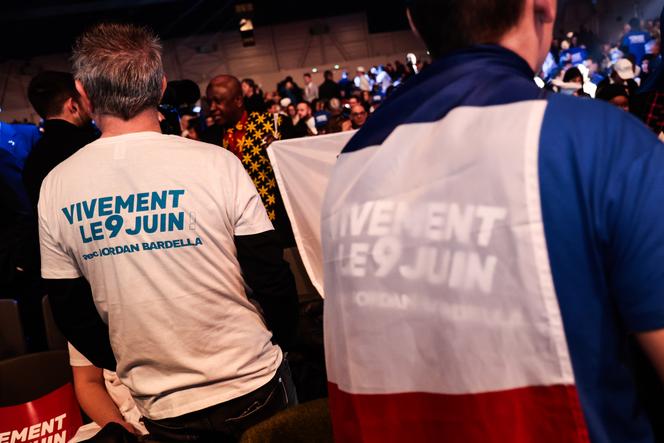


The far-right Rassemblement National (RN) is consolidating and broadening its base, while the presidential party, Renaissance, and its allies, the MoDem and Horizons, are falling behind. This is the main finding of the third wave of the opinion poll carried out by Ipsos-Sopra Steria ahead of the June European elections, in partnership with Sciences Po's Cevipof center, the Institut Montaigne, the Fondation Jean Jaurès and Le Monde.
Conducted between March 1 and March 6 among a representative sample of 11,770 people, the poll reveals a growing gap between Renaissance and the RN, which is credited with 31% of voting intentions among people certain to vote (with a margin of error of 1.3 points). The presidential party is now polling 13 points behind the RN list led Jordan Bardella, at 18% of voting intentions (margin of error: 1 point).
With three months to go before the June 9 vote, the face-off between the two sides threatens to turn into a solitary breakaway for the RN, while the presidential coalition falls below the 20% mark, less than 7 points ahead of the Socialists. In third place, the Socialist list led by Raphaël Glucksmann, of their Place Publique ally, stands at 11.5% (0.9 point margin of error) of voting intentions, slightly improving by 1 point. Next come the Greens, led by Marie Toussaint, at 8.5% (0.8 point margin of error), François-Xavier Bellamy's Les Républicains (LR, right-wing), and Manon Aubry's La France Insoumise (LFI, radical left), both at 7% (0.7 point margin of error).
The list led by Marion Maréchal for Eric Zemmour's Reconquête! party stands at 5% of voting intentions (0.6 point margin of error), followed by the Communists, led by Léon Deffontaines, at 3.5 % (0.5 point margin of error).
The strength of the RN is paradoxical. In our sample, 73% of those polled said they were in favor of the European project, with only 23% saying they would feel "great relief" if they were told tomorrow that the European Union was to be abandoned. Respondents planning to cast an RN ballot on June 9 represent a particular sub-group relative to the sample as a whole: They are more eurosceptic and anxious to make the ballot a marker of contestation of the government's domestic policy.
They also form a determined group, with a strong certainty of voting, more so than supporters of LFI or the Greens, for example. Eighty-three percent of those who said they would vote for the RN also said they were sure of their choice, compared with 70% of those voting for Renaissance. For the left-wing parties and the right-wing LR, more than 50% of those polled sometimes consider that their vote may yet change.
You have 60.98% of this article left to read. The rest is for subscribers only.
